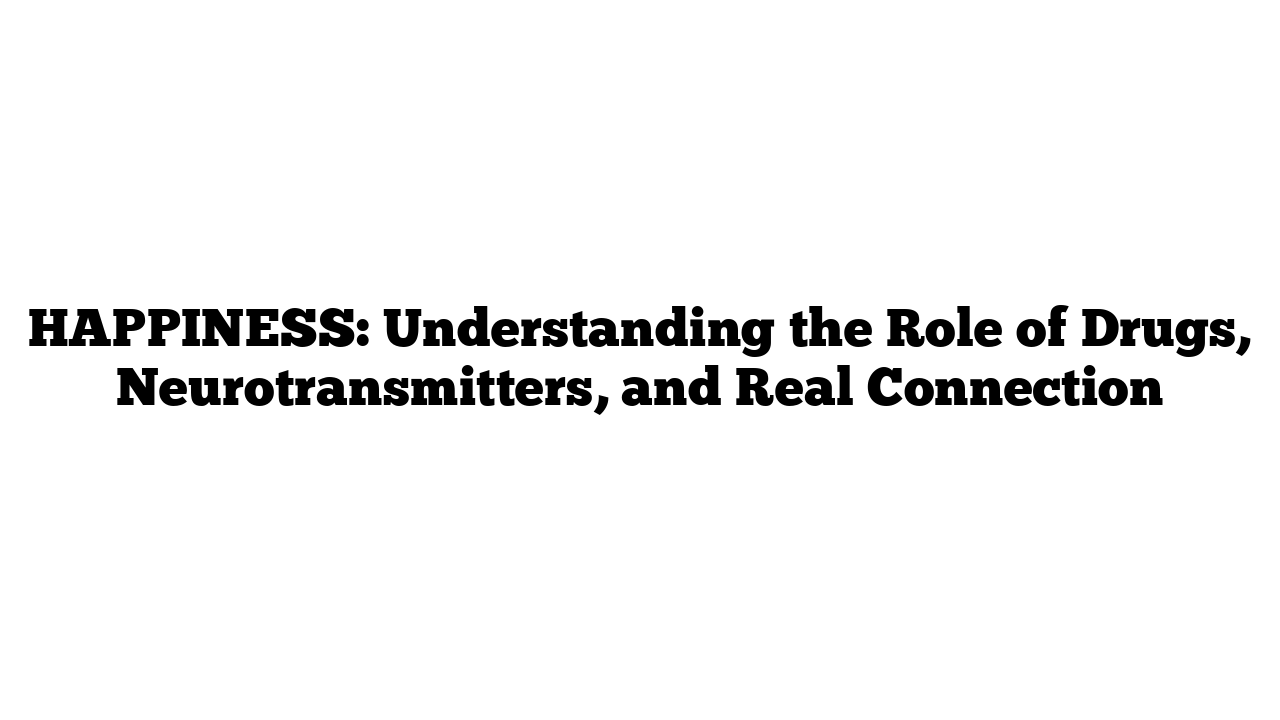Have you ever wondered what happiness truly is and how to get there? For many, the quest for joy has led to a mix of experiences, from prescription medications to recreational drugs. But what is the science behind happiness, and can we hack our brains for lasting fulfillment?
The Science of Happiness: What Fuels Our Joy?
Happiness is a complex blend of emotions driven by six key neurotransmitters:
- Dopamine (motivation and reward)
- Serotonin (well-being and calm)
- Oxytocin (love and bonding)
- Testosterone (confidence and drive)
- Cannabinoids (relaxation and euphoria)
- Opioids (pain relief and pleasure)
Each of these chemicals plays a unique role in shaping how we feel. But humans, being creative, often look for shortcuts. Drugs, whether prescribed or recreational, mimic or amplify these neurotransmitters to give us an emotional boost—sometimes at a cost.
How Common Drugs Affect the Brain
Let’s break down the effects of popular substances and how they interact with our brains:
1. SSRIs (e.g., Prozac, Zoloft)
These medications block serotonin reuptake, ensuring more serotonin stays active in your brain. This is why SSRIs are often prescribed for depression.
2. Stimulants (e.g., Cocaine, Adderall, Caffeine)
Stimulants flood your brain with dopamine, creating a surge of motivation and energy. However, frequent use can lead to dependency as your brain starts craving higher doses to feel the same effect.
3. Cannabis
Cannabinoids in marijuana mimic your brain’s natural endocannabinoids, leading to relaxation, euphoria, and altered sensory perception.
4. Opioids (e.g., Heroin, OxyContin)
Opioids mimic endorphins, the brain’s natural painkillers, creating feelings of well-being. However, withdrawal from opioids can be harsh, leading to symptoms like anxiety and muscle cramps.
Why Not Just Take All the Drugs?
Wouldn’t it be great if we could fill all our emotional “cups” with drugs? Unfortunately, it doesn’t work that way. Drugs typically target one neurotransmitter at a time, and rapid overuse can lead to addiction. Worse, relying on substances means your brain stops learning natural ways to balance itself.
Happiness Without Drugs: Can We Do It?
Interestingly, some neurotransmitters, like dopamine and serotonin, can be boosted through personal effort—think exercise, goal-setting, or practicing gratitude. But others, like oxytocin and cannabinoids, often require connection with others, such as sharing laughter with friends or bonding during significant life events.
The Magic of Social Connection
Research shows that memorable moments are often shared with loved ones. A dinner with friends, a heartfelt conversation, or a fun outing can activate multiple neurotransmitters simultaneously—dopamine (excitement), serotonin (contentment), and even oxytocin (connection).
How to Create Long-Lasting Happiness
True happiness is a mix of internal and external actions. Here’s how you can balance your brain’s “cups”:
- Cultivate Meaningful Relationships: Spend time with loved ones to naturally boost oxytocin and cannabinoids.
- Engage in Activities You Love: Find hobbies that challenge and excite you—dopamine thrives on motivation!
- Practice Gratitude and Mindfulness: Boost serotonin by focusing on the positives in your life.
FAQs on Drugs, Neurotransmitters, and Happiness
Q: Can drugs make you truly happy?
A: Drugs can provide temporary boosts by mimicking neurotransmitters, but they rarely lead to lasting happiness. Sustainable joy often comes from a mix of internal and social experiences.
Q: How do neurotransmitters affect emotions?
A: Each neurotransmitter governs different aspects of our feelings—dopamine drives motivation, serotonin ensures calm, and oxytocin fosters connection.
Q: Can you increase neurotransmitters naturally?
A: Yes! Activities like exercising, socializing, and even mindfulness can naturally boost key neurotransmitters like dopamine, serotonin, and oxytocin.
True happiness may not come in a pill or a shortcut, but rather through the relationships and activities that bring meaning to our lives. For more health and wellness insights, check out medicaltimes.io.
